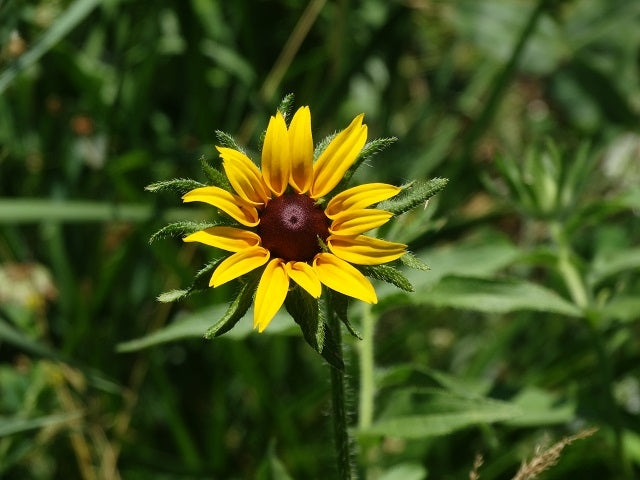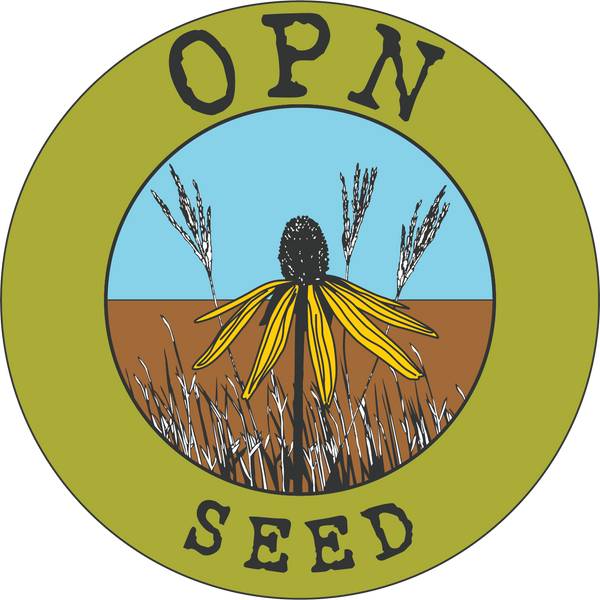Septic Field Native Seed Mix
Septic Field Native Seed Mix
Couldn't load pickup availability
Make your septic field a thing of beauty with this mix. This mix has been designed using plants that prefer dry soil because the root systems of these draw moisture from the septic system helping to make it more efficient. Takes advantage of subsoil moisture when present, but also able to tolerate dry periods. ReGreen can be added in quick cover and erosion control situations. Birds and butterflies will be attracted to the flowers that bloom spring to fall.
Native plants are uniquely qualified to handle septic fields. The range of moisture levels can be challenging for ornamental and introduced species. The deep fibrous root systems allow for great filtration. Native herbaceous plants lack a deep tap root like most shrubs and trees have, It is these tap roots which typically pose a risk to damaging the septic system's underground piping. Native plants help with filtration, provide much needed habitat for wildlife and look amazing. These native plants also create a landscape that keeps you from having to mow. Mowing septic fields can be challenging.
This mix is great for your septic field, but what about the septic tank, inspection ports and manhole covers that are protruding from the ground and have taken over your yard? There is no way around it, they need to be there, but you can try and disguise them. Short growing native plants are typically 3 feet and they only get taller from there. Native wildflowers and grasses are great at hiding these units. Utilizing native plants around these units hides them from site and creates habitat. Try creating a border around yours with ones of these native seed mixes:
Contains the following species:
Grasses:
Schizachyrium scoparium - Little Bluestem
Elymus virginicus - Virginia Wild Rye
Elymus canadensis - Nodding Wild Rye
Bouteloua curtipendula - Side-oats Grama
Bouteloua gracilis - Blue Grama
Koeleria macrantha - June Grass
Wildflowers:
Echinacea purpurea - Purple Coneflower
Gaillardia pulchella - Indian Blanket
Coreopsis lanceolata - Lanceleaf Coreopsis
Desmanthus illinoensis - Illinois Bundleflower
Senna marilandica - Maryland Senna
Chamaecrista fasciculata - Partridge Pea
Heliopsis helianthoides - Ox Eye Sunflower
Rudbeckia hirta - Black-eyed Susan
Liatris spicata - Dense Blazingstar
Dalea candida - White Prairie Clover
Verbena hastata - Blue Vervain
Asclepias tuberosa - Butterfly Milkweed
Hibiscus laevis - Halberdleaf Rose Mallow
Penstemon digitalis - Foxglove Beardtongue
Aster laevis - Smooth Aster
Solidago rigida - Stiff Goldenrod
Ratibida pinnata - Yellow/Grey-headed Coneflower
Seed Info
Seed Packet covers 250 square feet (a 10 x 25 area) and will take up to three growing seasons to fully establish.
PLS Lbs Per Acre Broadcast = 15
PLS=Pure Live Seed
Pure Live Seed is a measure of viable seed stated as a percentage. It is the product of total germination times purity.
Example: 96% Germination x 93% Purity = 89% PLS
All of our native warm season grasses and seed mixes are sold PLS.
Broadcast seeding is the process of sowing seed by hand. The seeds are sprinkled into the soil and can be lightly raked in to ensure germination.
This mix of native grasses and wildflowers typically grows to a height of 3 to 5 feet. Please note that each site is unique and can affect overall height. These factors include sunlight, hydrology and overall soil health.
Product Details
Flower Color: Green, Purple, Yellow, White, Orange
Height: 3 to 5 Feet
Light Requirements: At Least 6 Hours of Sunlight A Day
Soil Hydrology: Dry to Mesic
Bloom Time: Spring through Fall
Plant Type: Annuals/Perennials
Attracts: Birds, Bees, Butterflies, Pollinators
Suggested USDA Planting Zones: 3-7
Product Code: SF12S03
Color Boosters
The native perennials in your mix do require some patience to establish, but for instant gratification consider adding any of these quick establishing annuals. They're perfect pollinator plants, too!
Quick Growing Wildflowers Native Seed Mix
Cover Crops and Seed Carriers
Share


